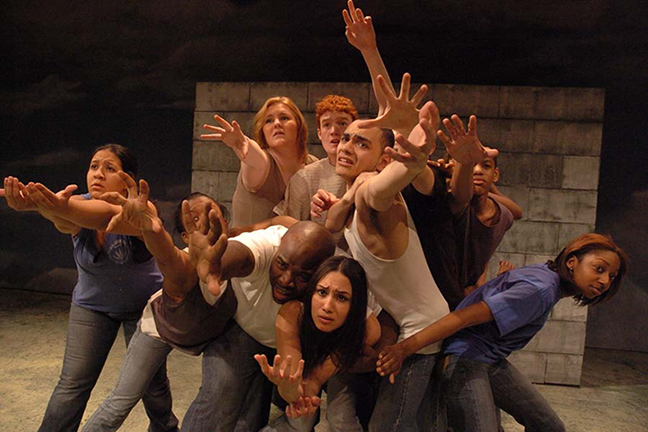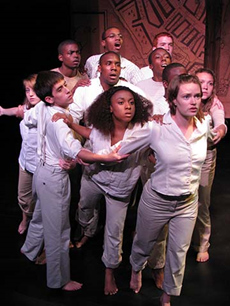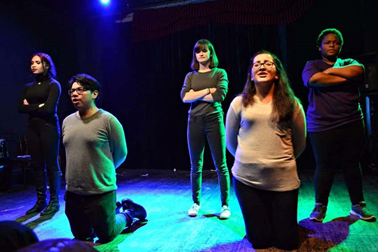News
Teens Devise Plays on Issues that Matter to Them
March 10, 2017THEATRE FOR YOUNG AUDIENCES - FEBRUARY 28, 2017
Theatre companies who help youth make work out of their own concerns are empowering them for life as well.
BY EMMA HALPERN

(Students perform as part of Creative Arts Team Youth Theatre.)
Creative Arts Team’s new show Language tackles issues of sexism and xenophobia, taking a frank look at the relationship among words, actions, and culture. Considering the tough subject matter, it’s probably not surprising that the show comes with a disclaimer: “Some material may not be suitable for younger audiences.” What’s more surprising is that the show’s creators and performers are still kids themselves.
Language, which runs Feb. 24-March 5 at the Baruch Performing Arts Center in New York City, is the latest production from CAT Youth Theatre, the company’s teen theatremaking wing. Every spring, the high school-aged ensemble puts on a devised piece that speaks to how the teens view themselves and the world.
“A lot of the work became about women and the way that women are being denigrated in so many different ways,” says Helen White, the director of CAT Youth Theatre. “There was a lot of resonance around the remarks Donald Trump made about the pussy comment, a lot of thinking about the labels that get put on people, and different words that get used according to who’s telling the story.”
Companies like the Civilians, the TEAM, and Tectonic Theatre Project are well-known for their devised work, mostly geared towards adult audiences, but devised theatre also plays a large role in the education world. Play building has been proven to increase written and verbal language skills, as well as less quantifiable traits like confidence, collaboration, and leadership.
Both academics and theatre practitioners have published guides to devising in the classroom. CAT and other companies across the country are blending these approaches to help young artists create high-quality, socially engaged theatre for the general public. In these instances, the devising model becomes more than a teaching tool, as young artists create innovative theatre at a professional level.
Founded in 1995, CAT Youth Theatre is free to all students who participate, and acceptance into the program is first-come, first-served. There are no auditions, and members attend rehearsals one to three times a week depending on their availability. Every year, older students age out and new students join, often coming up from CAT’s Junior Youth Theatre for middle school students. Like most ensembles, the makeup of the group shapes the work going forward.
 “The beginning of the process is very much about ‘Who is this group now? What kind of theatre are we excited about?’” says White. “’What is it that’s going on in the world? What it is that’s going on in your lives at the moment that you want to celebrate or critique?’ So we look at how we might put that into our theatre.”
“The beginning of the process is very much about ‘Who is this group now? What kind of theatre are we excited about?’” says White. “’What is it that’s going on in the world? What it is that’s going on in your lives at the moment that you want to celebrate or critique?’ So we look at how we might put that into our theatre.”
Those discussions are followed by play-building exercises and feedback sessions, where students work on their feet to explore ideas that resonate with the group. “We do not start by saying to the young people, ‘You’ve got to tell us your personal stories.’ We very much work through what is going on in the world,” White explains. “Obviously, our personal stories are going to be fed into whatever we create, but we work a lot through fictionalizing characters based on what we know about the world, and asking, ‘What do we not know about this topic that we can find out more about?’”
This year the cohort examined themes of communication, and the topic became the driving force of the production. “There’s a scene where we look at what is language beyond just words—looking at it in terms of disability and the ways in which we use words,” says White. “There’s a lot about how language is tied to history, and the history of why some folks don’t speak their native language. Histories of oppression that have meant that those languages have been taken away and how painful that can be. But also how celebratory that can be, when you’re looking at how your culture survives even if your language has been taken away.”
In Chicago, Collaboraction’s Peacemakers Teen Ensemble uses a similar process. High school-aged students volunteer their time twice a week to build a devised piece. Members of the Peacemakers have received previous training from Collaboraction’s after-school program and are interested in creating bold theatre that speaks to their community.
“There are teens who always want to continue working when there are gaps in between programs, and that’s really how the Peacemakers emerged, out of these teens who found this need to take their work to the next level,” says Luis Crespo, director of youth programming at Collaboraction. “The goal is to start a dialogue where we can have adults and our teens speak about issues that really are affecting everyone, and what potential we have to make change.”
While the Peacemakers work largely on their feet, there is a strong writing component to their method. “We talk about issues that they feel strongly about, and then I’ll give them a creative writing prompt,” explains Crespo. “I encourage them to utilize free writing, spoken word, poetry, or song lyrics. From there, we discuss common themes, talk about what we just wrote, and see what dialogue we can create, what characters we can cultivate, and what storylines come to life. Once the material is generated, it can take any number of directions, trying to explore that material through a variety of performing methods—including singing, dancing, and non-verbal storytelling.”
One of the Peacemakers’ most notable performances took place during last summer’s first annual Peacebook festival. The event is a city-wide celebration featuring live performances across three different parks, all with a focus on promoting peace in Chicago. The Peacemakers performed Peace, Hope, and Love, a devised piece that utilized physical theatre, spoken word, and music to engage with gun violence, education inequality, and other issues affecting Chicago. Collaboraction is currently planning the second annual Peacebook festival for fall 2017.
 “When an audience sees a show where the youth of the city speak to them, there’s a definite shift,” says Crespo. “Audience members see a scene that might change the way they talk with their wife or their husband or their kids.”
“When an audience sees a show where the youth of the city speak to them, there’s a definite shift,” says Crespo. “Audience members see a scene that might change the way they talk with their wife or their husband or their kids.”
Both companies emphasize the ways in which their programs uniquely position students to pursue careers in theatre. “Once our teens hit 20 years old, they’re ready to enter the theatre world,” says Crespo. “We have so many artists in our city that care about the youth, and the local theatre community is very supportive of the program.”
CAT Youth’s White agrees. Teens in her program are “not just thinking about the single performer or the acting skills, but learning about ensemble. They’re thinking about the purpose of theatre and exploring how theatre works. I think they’re able to learn skills they wouldn’t necessarily learn in all theatre training programs.”
These programs’ impact extends off the stage as well. “Once they join the program, they feel a responsibility to be more civil toward one another and more collaborative,” says Crespo. “Peacemaker is not just a word; it’s an actual way of behaving and interacting with other people. There are some great leaders that are going to be coming out of the program.”
Says White, “We have young people who have started campaigns, who have become teachers, and others who are fighting for food justice, but virtually every young person who comes through ends up talking about the power of the community. I think young people are watched for so much of their lives. They’re supervised, they’re controlled. To have a space they get to say, ‘This is our space, how are we going to operate? What is the content we want to put in?’ gives them a lot of freedom.”
Original Article: http://www.americantheatre.org/2017/02/28/teens-devise-plays-on-issues-that-matter-to-them/











